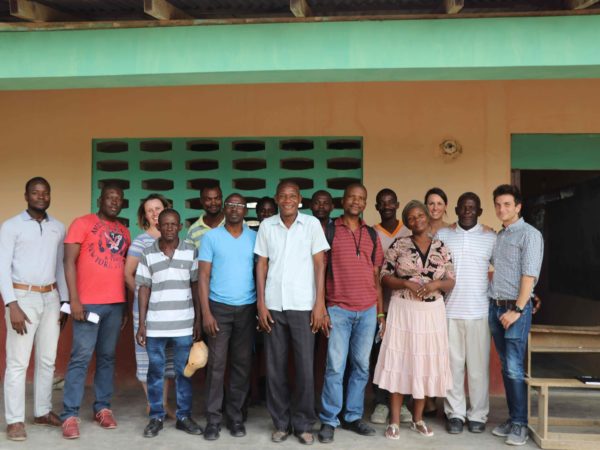About Us
Our Mission
Accountability Counsel amplifies the voices of communities around the world to protect their human rights and environment. As advocates for people harmed by internationally financed projects, we employ community driven and policy level strategies to access justice.
Why We Are Needed
Internationally financed projects such as dams, mines, and oil pipelines are notorious for environmental and human rights abuses. Increasingly, we see renewables and climate finance contributing to the same type of harm, including forced displacement of Indigenous people, poisoned rivers used for drinking water, labor rights abuses, and sexual abuse of women and girls by foreign workers.
The millions of people a year who suffer these types of abuses have few options for recourse. Those who most need access to justice often face the greatest barriers to information, have the least political power and the fewest financial resources, and lack the support required to seek it. Accountability Counsel exists to bridge these barriers for communities and create accountability in global finance resulting in systemic change. Accountability Counsel works to hold nearly $12 trillion a year accountable to global human rights and environmental standards.
Our Values
- Accountable: We are accountable to advancing our mission, upholding our values to the communities we serve, to our donors, to our Board, and to the greater public.
- Community-driven: We only work at the request of communities that reach us through trusted networks, and our community clients lead decision-making.
- Diversity, equity, and inclusion (DEI) committed: We acknowledge and work to address the individual and collective ways that discrimination, racism, bias, and stereotypes impact our own organization, as well as the communities we serve. Accountability Counsel is committed to being a diverse, equitable and inclusive workplace, reflected through hiring practices; internal culture, training and programming; as well as through our approach to the world around us. Read about our Compensation Equity and Transparency Framework here.
- Knowledge-sharing: We train partner organizations as we collaborate so that they can bring their own accountability office cases, ensuring that our expertise is multiplied beyond our direct casework.
- Remedy-oriented: We accompany our client communities through the “last mile” of their campaigns for justice and commit to improving lives and environments where we work.
- Respect-based: Our respect for human dignity and rights, what we call our ‘respect-based approach,’ governs our external and internal work, culture, and operations. Read more about our respect-based approach here.
- Sustainability-focused: Lessons from our cases translate into policy advocacy that generates systemic and lasting change; our advocacy to create new accountability offices generates new and ongoing opportunities for communities seeking justice. We work with partners through our Solidarity Fundraising program, building fundraising capacity of local and grassroots organizations that sustain our moment.
- Transparent: Our commitment to transparency includes information about our programmatic work, our international governance and operations, our financials, and our impact.
We have adopted a Code of Ethics which describes our pledge to operate with mutual respect in the pursuit of equality, security, and dignity of our clients. Accountability Counsel is independent from the influence of governments, corporations, and other institutions.
We are committed to working in an interdisciplinary and intersectional movement for justice. Through our Good Ally program, we encourage our staff to take action to protect the rights of allied communities and the environment up to 40 working hours a year. This may include working on issues where our team is moved to immediate, local action outside of their job duties.
Theory of Change
The impact we seek through our theory of change is that: communities take part in decisions that affect them and secure remedy to realize rights; effective and robust accountability systems deter abuses; and international institutions and corporations respect communities and prevent abuse.
See our full theory of change here.
Our Programs
Communities
At the request of communities, our advocates assist people to effectively use accountability offices to defend their rights and remedy harm caused by internationally financed projects. We use our expertise with these offices to add value to locally led strategies for human rights and environmental justice. Learn more about our Communities approach and meet our clients here.
Policy Advocacy
We advocate for accountability offices that are independent, fair, transparent, professional, accessible, and effective tools for justice. We identify accountability gaps and seek creation of new offices to fill them. And we translate the lessons from our cases into advocacy for systemic change. Learn more about our Policy approach and our advocacy here.
Research and Accountability Resources
Our research informs the movement for accountability in international finance with in-depth research to support our community cases and policy initiatives, data and analytics to expose patterns in our field, and interactive tools to improve transparency and access to information. Learn more about our research here.
Together, we produce trainings and guides, and convene a global network of 140 advocates from every region that works collectively to achieve change.
History
Natalie Bridgeman Fields founded Accountability Counsel to continue more than a decade of her work toward environmental and human rights accountability in international finance and development. Accountability Counsel’s status as a nonprofit organization began in September 2009, after Natalie received an Echoing Green Fellowship to support the organization’s founding. We were recognized as a high impact social enterprise with a fellowship from the Draper Richards Kaplan Foundation in 2015.

